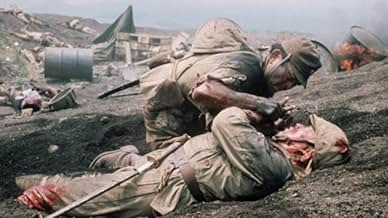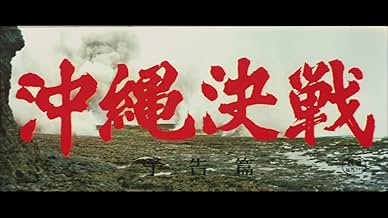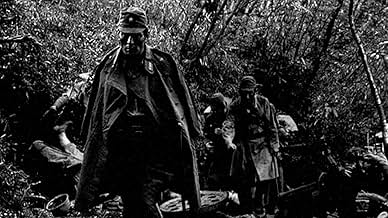AVALIAÇÃO DA IMDb
6,9/10
507
SUA AVALIAÇÃO
Adicionar um enredo no seu idiomaTold from the Japanese perspective, this war drama captures the events of World War II's Battle of Okinawa - a massive amphibious assault by U.S. troops that left more than 150,000 Japanese ... Ler tudoTold from the Japanese perspective, this war drama captures the events of World War II's Battle of Okinawa - a massive amphibious assault by U.S. troops that left more than 150,000 Japanese civilians dead.Told from the Japanese perspective, this war drama captures the events of World War II's Battle of Okinawa - a massive amphibious assault by U.S. troops that left more than 150,000 Japanese civilians dead.
- Direção
- Roteiristas
- Artistas
- Direção
- Roteiristas
- Elenco e equipe completos
- Produção, bilheteria e muito mais no IMDbPro
Avaliações em destaque
Battle of Okinawa is a film directed by the now legendary Kihachi Okamoto. It stars Tatsuya Nakadai and Tetsuro "I'm in every Japanese film" Tamba. Both show off their acting chops in this film and deliver outstanding performances. Don't get me wrong though, there are dozens of actors in this film with almost equal scream time as these two men. This is definitely an ensemble piece on one of the most gruesome slaughters on the Japanese armies front. This film is not easy to watch. It is much more violent than "Letters From Iwo Jima" and as in "Iwo" we see how fanatical the Japanese army was at this point in history. Being taken prisoner was not an option and losing meant death or forever living in dishonor. This notion is even implemented to civilians who in this move kill themselves in droves. Tatsuya Nakadai's character is one of the few characters who believes that suicide in not the only option in defeat. He is the western voice in the film for his character even studied in America. This is a hard core war film that takes no prisoners. I recommend you go out and buy this film for it is now available in R1 DVD thanks to the fine folks at AnimEigo.
Chronicling the bloodiest and most pointless last stand of the Pacific Theatre, The Battle of Okinawa is far more well-known nowadays for essentially giving Hideaki Anno his career. Told in a quasi-documentary-like format, with black and white newsreel footage juxtaposed with narration from Kiyoshi Kobayashi over the dramatic scenes, Kihachi Okamoto manages to expertly balance horrific authenticity with few artistic liberties taken along the way. It's a film that captures an essence of bravery, lunacy and hollow childlike subservience, as well as the sheer devastating horror that gets increasingly desperate and progressively violent the longer it goes on, the final 5-minutes alone comparable to the likes of Saving Private Ryan in its entirety; Okamoto pulls no punches in the graphic details with his cynical, dark sense of humour coming out in full force. With incredible performance from its cast, most notably Tetsuro Tanba and Tatsuya Nakadai, a fantastic if limited score by Masaru Sato and energetic direction, The Battle of Okinawa is an incredible epic, one of exhaustive and continual bombardment that takes no prisoners leaving the camera smeared with blood by its dramatic end.
This is an exhaustive (and exhausting) account of events surrounding the Battle of Okinawa, beginning with pre-invasion defense preparations (starting in July 1944), then moving to the aerial bombardment, to the US invasion, and finally to ground combat. In its desire to be "complete" and thoroughly document the battle (from the Japanese POV, of course), it shortchanges story and characters. It feels like three hundred mini-vignettes rapidly spat out by a machine gun rather than a smoothly flowing, cohesive whole.
As for historical context and accuracy, others have already pointed out their reservations about the Japanese being framed as noble, even heroic, warriors fighting the good fight against overwhelming odds. This complaint about its narrative framing also applies to virtually every Japanese film about World War II. In the collective cinematic imagination of Japanese WWII films, the "war" is treated almost as a cosmic, non-human, event that simply happens TO them. Unlike in many German films where characters ponder "will the world forgive us?" or "now our chickens are coming home to roost. We will now reap what we have sown", in Japanese films, it is almost always "oh poor us. We are losing. It's so sad. Why must we lose? What about our honor? What about our children?"
As for historical context and accuracy, others have already pointed out their reservations about the Japanese being framed as noble, even heroic, warriors fighting the good fight against overwhelming odds. This complaint about its narrative framing also applies to virtually every Japanese film about World War II. In the collective cinematic imagination of Japanese WWII films, the "war" is treated almost as a cosmic, non-human, event that simply happens TO them. Unlike in many German films where characters ponder "will the world forgive us?" or "now our chickens are coming home to roost. We will now reap what we have sown", in Japanese films, it is almost always "oh poor us. We are losing. It's so sad. Why must we lose? What about our honor? What about our children?"
I bought this movie for a higher price than i'd care to admit, expecting a interesting take on the Battle of Okinawa with real facts and maybe some cool battle scenes. I was extremely disappointed.
Over the entire movie we are presented with the spiritually pure Japanese angels desperately fighting against those American Yankee murderers that only win the battle because they have unlimited ammo hack Thompson's that they spray and pray without discrimination, as well as some obligatory war crime weapons like chemical bombs. Which as a reviewer before mentioned was not even in use during the Okinawa invasion. I at the same time understand and hate the decision by movie-makers to portray ones own side in a better light than the other. But deliberately making your own side seem so good as it was presented in this movie is borderline historical revisionism. Which is a curse word in my dictionary.
One thing that irked me: Okinawan's were treated like trash by the Japanese during the actual invasion, yet here we are presented with Okinawan civilians that gets denied the great honor of joining the mass suicide of the Japanese soldiers, but eventually after proving their spirit the Japanese soldiers kindly allow them to use one of their grenades to off themselves. I have no doubts that some Okinawan's wanted to willingly kill themselves, but mainly the Okinawan's actually wanted to surrender to the Americans due to how crappy the Japanese treated them, using them as human shields and deliberately forcing them to kill themselves.
Also the combat scenes themselves mainly consists of the Japanese soldiers trying to get stabby stabby while the Americans use 2000 bullets on each of the Japanese in return. There is a lot of gore and blood everywhere, but it comes off as fake and stupid with the bad fighting choreography and the random narrator commenting on how "glorious" the Japanese defenders were.
I suspect the Japanese ultra-nationalists welcome this movie's inaccuracy, but at the same time it also fails as a entertaining movie. The document mixed with the bad acting makes this entire ordeal seem like a lifeless propaganda film that i could easily imagine being created by the actual WW2 Japanese government. That this was actually created 20 years afterwards is astonishing to me.
The history is not actually completely wrong, it is just glaced with lies to make it seem factual. That makes this the worst attempt at propaganda i have ever seen. And i hope that whoever Japanese director that wrote the line "this is the best war movie ever made" which made me buy the movie will be forced to watch Fires on the plain, letters of Iwo Jima or Stalingrad so he can see an actual good war movie and how pointless war actually is.
Man i could go on and on about how bad this movie is To sum it up, this is a stupid jingoistic and historically wrong document movie with many horrible combat scenes.
Over the entire movie we are presented with the spiritually pure Japanese angels desperately fighting against those American Yankee murderers that only win the battle because they have unlimited ammo hack Thompson's that they spray and pray without discrimination, as well as some obligatory war crime weapons like chemical bombs. Which as a reviewer before mentioned was not even in use during the Okinawa invasion. I at the same time understand and hate the decision by movie-makers to portray ones own side in a better light than the other. But deliberately making your own side seem so good as it was presented in this movie is borderline historical revisionism. Which is a curse word in my dictionary.
One thing that irked me: Okinawan's were treated like trash by the Japanese during the actual invasion, yet here we are presented with Okinawan civilians that gets denied the great honor of joining the mass suicide of the Japanese soldiers, but eventually after proving their spirit the Japanese soldiers kindly allow them to use one of their grenades to off themselves. I have no doubts that some Okinawan's wanted to willingly kill themselves, but mainly the Okinawan's actually wanted to surrender to the Americans due to how crappy the Japanese treated them, using them as human shields and deliberately forcing them to kill themselves.
Also the combat scenes themselves mainly consists of the Japanese soldiers trying to get stabby stabby while the Americans use 2000 bullets on each of the Japanese in return. There is a lot of gore and blood everywhere, but it comes off as fake and stupid with the bad fighting choreography and the random narrator commenting on how "glorious" the Japanese defenders were.
I suspect the Japanese ultra-nationalists welcome this movie's inaccuracy, but at the same time it also fails as a entertaining movie. The document mixed with the bad acting makes this entire ordeal seem like a lifeless propaganda film that i could easily imagine being created by the actual WW2 Japanese government. That this was actually created 20 years afterwards is astonishing to me.
The history is not actually completely wrong, it is just glaced with lies to make it seem factual. That makes this the worst attempt at propaganda i have ever seen. And i hope that whoever Japanese director that wrote the line "this is the best war movie ever made" which made me buy the movie will be forced to watch Fires on the plain, letters of Iwo Jima or Stalingrad so he can see an actual good war movie and how pointless war actually is.
Man i could go on and on about how bad this movie is To sum it up, this is a stupid jingoistic and historically wrong document movie with many horrible combat scenes.
The film is pretty bad across the board. Even ignoring the poor special effects due to budget, the direction and editing is poor. A tighter script and decent editing would have done wonders for what could have been a good film. The story line is grim, of course, but is badly handled and is an emotionless tale of waste. To get an emotional response from an audience you need to care about the characters, and that empathy is what the movie truly lacks. The film is a docudrama, but lacks drama and the power of a documentary. It's worth a look, but is certainly not a good film. Compare BoO with Story of a Prostitute, Fires on the Plain, or The Burmese Harp, and you'll understand why it is a forgotten film.
Você sabia?
- CuriosidadesDirector Hideaki Anno has mentioned that this is the film he has watched the most in his life, well over 100 times.
- ConexõesReferenced in Câmera da África (1983)
Principais escolhas
Faça login para avaliar e ver a lista de recomendações personalizadas
- How long is Battle of Okinawa?Fornecido pela Alexa
Detalhes
- Data de lançamento
- País de origem
- Idioma
- Também conhecido como
- Battle of Okinawa
- Empresa de produção
- Consulte mais créditos da empresa na IMDbPro
- Tempo de duração
- 2 h 29 min(149 min)
- Cor
- Mixagem de som
- Proporção
- 2.40 : 1
Contribua para esta página
Sugerir uma alteração ou adicionar conteúdo ausente
































